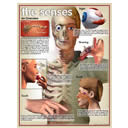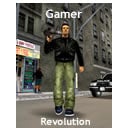
Brain Games: Super Senses
We are taught that we only have five senses, the sense of touch, taste, smell, sight, and hearing. All five help us navigate and give meaning to everything that happens in the world around us. However, we use more than five senses almost daily, and most of the time, we don't even realize it.
This episode of Brain Games demonstrates what happens when we take the time to activate our brains a bit more and combine our senses. Each combination or pairing helps unlock a so-called hidden or super sense. For example, combining touch + sight + sound equals your sense of balance. Balance - just like other hidden senses - are constantly helping us navigate our everyday lives.
Their crew set up stations all over New York's Times Square to get as many volunteers for the games. First up was guessing someone's age - without seeing them first - based on how good they balance on one leg.
Another game dealt with the sense of hearing. Subjects first listened to music on high-quality headphones. They then heard "disturbing" sounds like nails scratching a blackboard, a dentist's drill, and someone throwing up. The listeners felt disgusted, immensely bothered and uncomfortable. This game proved that certain sounds trigger the amygdala - or the brain's fight or flight control - so our bodies recognize coming danger or distress.
The next "super" yet everyday sense they tackled was proprioception, or when we sense our body's position during movement. The show proved that this super sense could be manipulated. By simply introducing a new or foreign movement, our brains get confused and can no longer recognize body size or direction.
Times Square tourists and passers-by also got a chance to try and ride a backwards bike - when you turn left, the wheels turn right and vice versa. Everyone failed the game except for a professional BMX biker who rode nothing but the backwards bike for two weeks. Strangely enough, when they made him ride his regular bike, he could no longer do so.
There was also a visual game wherein participants chose which of two different sized boxes was "heavier." Only two weightlifters guessed that both boxes weighed the same. Finally, a so-called "mind reader" amazed the crowd by seemingly reading/guessing what was on their minds. In reality, he was practicing the fine art of micro-observations, fine-tuning his senses to see, hear, notice small movements many times better than everyone else.
These games prove that our senses are more connected to our bodies than we realize. They also illustrate how it is possible to hack our brains so that our senses can do more. Like the mind-reader, bike rider and weightlifters, constant practice allows us to challenge our brains to uncover our super senses.
New neurological pathways can form to help us process new information and do new things easily. This is useful when we want to break bad habits and make new, positive ones. And of course, beneficial to our lives in general.




another 'sense' not mentioned is - proprioception - the ability to locate an object - say having a drink from a glass . putting it down , then (without looking) locating and finding it again
Our senses are "super"? Compared to what? Our senses may be used by us in unidentified ways and we have physical muscle reactions that are automatic and universal, but that is in no way "super". The mentalist is making observations based on his study of facial/body "tells" that are uncontrollable/universal for all humans. His skill is unique compared to the average person, but some people are even more unique in that they have acquired this skill without study. It was learned subconsciously.